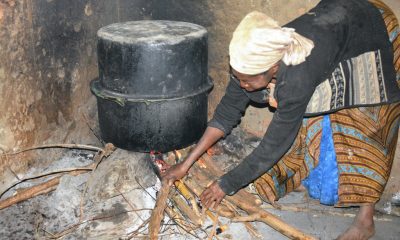News
High price of cooking gas taking toll on us, several South-West residents lament

High price of cooking gas taking toll on us, several South-West residents lament
SEVERAL residents of some states in the South-West zone of the country are lamenting the astronomical increase in the price of cooking gas, saying it is severely affecting them.
The residents told the News Agency of Nigeria (NAN) in separate interviews that unless government intervened urgently, the situation may force them to discard using gas to cook.
They said they may have no other choice than a return to using charcoal, firewood and sawdust, among other archaic means of cooking.
NAN reports that 12.5 kilogramme (kg) of gas now sells for between N10,000 and N10,625 as against the N8,700 it was being sold before in some parts of the zone.
A 6 kg equivalent goes for between N4,800 and N5,100 instead of N4,176.
The residents, who expressed shock with the cooking gas situation, said that they never prepared for such an astronomical increase.
They lamented that this has come particularly with the increase in the price of petrol, with its attendant negative effects.
The residents appealed to government to, as a matter of urgency, step up measures to address the situation in order to reduce the sufferings of Nigerians.
A housewife, Mrs Eunice Alabi, a resident of Ayegun-Fasade in Egbeda Local Government Area (LGA) of Oyo State, said the situation is not economically wise for her.
“A low income-earner like me cannot afford to buy a kilogramme of cooking gas at a cost of N850. That is the situation we are in now,” she said.
READ ALSO:
- (BREAKING) Rivers: Tribunal throws out LP’s petition, upholds gov Fubara’s election
-
(BREAKING)Nasarawa: Tribunal affirms gov Sule’s election
-
BREAKING: Alison-Madueke arrives London court over bribery charges
Alabi said she had already returned to the use of a sawdust stove at little or no cost to her, aside getting sawdust from a nearby sawmill.
Mr Michael Tubosun, a commercial motorcycle operator at Iwo-Road in Ibadan North-East LGA, contended that using gas to cook now had become the exclusive right of the rich.
He said he had bought a charcoal pot for his wife to cook.
Also speaking with NAN, a roadside beans and yam vendor at Oluwo junction in Egbeda LGA, Mrs Jelilat Yusuf, said she had embraced the use of firewood for cooking.
“I thought I was becoming modern by using gas, but now I can not afford gas again,” she said.
According to Yusuf, firewood is cheaper and makes her to make more profit than using gas.
Although she expressed concern about the smoke from firewood, which, she said might not be good for her health, Yusuf however said she had no choice.
“Since gas has gone out of my reach, I have no choice.”
She implored government to intensify efforts toward bringing down the price of cooking gas and foodstuffs.
An environmentalist, Mr Bola Ogunrinde, however, said using the alternatives to gas could be dangerous to health.
“Dioxin, one of the substances released when plastic is used and inhaled, can instantly cause coughing, shortness of breath and dizziness,” he stated.
A gas retailer, Mr Zacheaus Akinlabi, also said he had witnessed a marked reduction in the number of customers patronising him due to the sudden increase in gas price.
“Since the hike in price of gas, some of my customers have stopped patronising me, while the few that come around only buy the fewN kilogrames they can afford,” Akinlabi said.
A food vendor, Mrs Funmi Durodola, said that she had shifted from using gas to charcoal.
Although Durodola said that a bag of charcoal had also increased from N3,500 to between N4,700 and N5000, nevertheless she said it was still more economical than gas.
Mrs Tolu Adejo, a mother of three, said: “When gas was between
N700 and N750 per kg, my husband usually refilled for us, while we support our cooking with firewood, especially when we wanted to cook beans.
“To make matters worse, kerosene is also beyond our reach and so we now use firewood, alongside plastic and nylon to do our cooking, because we just have to survive,” Adejo said.
The situation is the same in Ilorin in Kwara, as most residents have resorted to use of charcoal and firewood due to the hike in the price of gas.
READ ALSO:
-
Nine dead, 20 trapped after Mexico church collapse
-
Former Chicago State University President to sue Tinubu over forged certificate
-
Tottenham 2-1 Liverpool: ‘VAR error undermined sporting integrity’ – Reds
Mrs Munirat Bello, a teacher at a private school in Ilorin, said she had embraced the use of charcoal to complement the little gas she could afford.
A housewife, who also plaits hair for a living, who simply identified herself as Mama Bashira, also said that the situation had gone bad for her.
She said she had to resort to the use of charcoal.
“A bag of charcoal sells for as low as N1,500 if a person can get it straight from the farm and if well-managed, it can last for a month or even more,” Mama Bashira said.
Similarly, Hajia Lateefah Yusuf, a business woman, expressed surprise with the sudden increase in gas price, in spite of what she called the rhetoric of abundance of gas in the country.
A civil servant with Kwara Ministry of Agriculture, Mrs Abosede Buraimoh, described the situation as very worrisome and unbearable, calling for urgent intervention by government.
An artisan, Mrs Titilayo Oshagbemi, said she had stopped patronising gas stations due to the hike in the price of the product.
“I prefer to buy a bag of charcoal at the rate of between N3,000 to
N3,300, than to buy 5 kg gas at the rate of N4,750 or N5,400, while the charcoal will last longer than gas,” she said.
For Alhaja Tawal Aliyu, an artisan, the price of gas has become ‘scary’.
“How can I buy 1 kg of gas for N850 with the current economic hardship? No. I will rather get firewood to cook,” Aliyu lamented.
A resident of Ilorin, Mrs Afusat Jimoh, described the situation as frustrating, saying most people had dumped their gas cylinders and picked charcoal stoves.
“I’ve told my children to go and keep our cylinder somewhere in the
store. I am conveniently using my charcoal stove now. It saves me more money,” she said.
Mrs Toyin Aina, who said that many people had resorted to the use of kerosene stoves and charcoal stoves, called on the Federal Government to “act fast.
“This is because things are now very hard and tough in Nigeria.”
One of the attendants at a gas station, Mr Mubarak Bello, said patronage had dropped since the gas price had increased.
The Founder of Green Environment Movement, an environmental non-governmental organisation (NGO), Mr James Akinyemi, however said that using nylons and plastic to aid burning of charcoal could result in cancer.
According to him, burning plastics releases toxic chemicals into the air which, when inhaled, can cause cancer.
”Poly chlorinated biphenyls (PCBs), polycyclic aromatic hydrocarbons (PAHs) and dioxins are among the most toxic chemicals commonly released into the air when burning plastics.
”Chronic exposure to these chemicals can interfere with hormone functions and cause cancer.
“So, it is better to avoid burning of plastics and nylons as much as possible,” he said.
Akinyemi noted that the economy was not friendly with the recent increase in price of gas.
He however cautioned people against using items that could have negative effect on their health.
NAN checks in Ogun also indicate that 12.5 kg of gas now sells for between N11,200 and N12,800 in some gas stations across the state.
NAN also reports that the situation has led to an increase in prices of foodstuffs as well as reduction in the quantity served for certain
prices at various restaurants and food joints.
Mrs Florence Akpan, a food vendor at Adeoyo area of Ijebu-Ode, said that sales had dropped significantly due to increase in gas price.
“Customers now complain about the reduction in the quantity of food being sold to them.
“I now cook small quantity of food because sales have really gone down and there is nothing I can do because I have to cover my cost and add small profit margin too.
READ ALSO:
-
I would have depreciated Naira to N600 – Peter Obi
-
JUST IN: Gunmen storm Plateau community, kill 9 in late-night attack
-
Nightclub fire kills at least nine in Spain
“Times are really hard for both buyers and sellers now. It is a serious matter,” she said.
Another food vendor at Oke-Ilewo area of Abeokuta, Mrs Dorcas Sobowale, told NAN that for her to continue in business, she had resorted to using charcoal.
“While a bag of charcoal costs N5,000, 12.5 kg of gas now sells for N12,800.
“Although cooking with gas is more convenient and faster, I have to make the necessary sacrifice and adjust to using charcoal and firewood to survive in business.”
A gas retailer, Kabiru Adegoke, said the price of cooking gas was not stable, “as it goes up and down in a matter of days.
“Patronage has really been affected due to the high cost of gas per kg, which is now N840 from the N700 we sold it two weeks before now.
“Hardly do we now see people filling up their 12.5 kg cylinder again.
Rather, they fill in small quantities like 2kg and 3kg,” Adegoke said.
Mrs Fauziyah Adebiyi, another resident of Abeokuta, lamented that life had been really difficult since the sudden increase in the price of gas.
She said what would have been the next and easy alternative was kerosene stove, “but sadly enough, kerosene itself is a no-go area now.
“The last time I needed half a bottle just to mix an insecticide, I
was told it was N400, meaning that a bottle is N800. How does one buy that easily with the hardship in the land?” Adebiyi queried.
For Mr John Akpan, a landlord in Mowe area of Obafemi-Owode LGA of Ogun, he has had to unfortunately ban the use of charcoal in his house.
Akpan said his tenants had resorted to the use of charcoal in
the wake of gas price increase.
He said the kitchen and other areas within his two-storey building had become messy, with the walls stained with coal.
“I know times are hard, but if the situation continues unchecked, I
will have to spend money on painting the house from time to time,” Akpan said.
In her reaction, another gas user, Mrs Taiwo Akande, said she had been switching between electric stove and gas cooker for her cooking.
“We are still using the old metering system in my compound. So, I use electric burner for most of my cooking whenever there is power.
“I may have to resort to charcoal when our prepaid meter is installed and the situation persists,” she said.
Mr Johnson Adigun, an urban and regional planner, listed alternative means of cooking to include: kerosene, charcoal, saw dust and firewood, all of which he, however, said had “far-reaching” consequences.
According to him, firewood often pollutes the environment and worsens the climate change crisis, aside the health implications like lung cancer which can lead to premature death.
To Mr Kayode Ahmed, an environmentalist, one of the possible consequences of using firewood and charcoal for cooking is deforestation.
Ahmed said such situation could arise when trees were not planted to replace those being cut for firewood.
Another environmentalist, Mr Ola Oresanya, maintained that the use of bio-gas and solar stove as alternative sources of cooking might not be detrimental to the environment.
“Bio-gas is the most environmental-friendly, and also a renewable source of energy.
“Using solar to cook is also reasonable and not having any adverse effect on the environment,” he said.
High price of cooking gas taking toll on us, several South-West residents lament
(NAN)
News
British High Commission shuns Prince Harry, Meghan ceremonies in Nigeria

British High Commission shuns Prince Harry, Meghan ceremonies in Nigeria
Prince Harry and Meghan Markle’s visit to Nigeria has stirred up disquiet at the British High Commission in Abuja, as their presence went unacknowledged by relevant officials.
Despite the couple’s arrival in the populous nation and various welcoming activities, including meetings with military authorities and dignitaries, the British High Commission’s social media handles remained silent on their visit.
British High Commissioner to Nigeria, Richard Montgomery, clarified in an interview that the visit was in a private capacity and not arranged or facilitated by the commission. Hence, they were not representing the UK government’s work during their time in Nigeria.
During their visit to Kaduna, Prince Harry emphasized the importance of sports in the rehabilitation of wounded soldiers, focusing on meeting with Nigerian armed forces veterans.
READ ALSO:
- Soldiers killing: Okuama returnees collapse on seeing destroyed homes
- Why I claimed Ooni is my father – Man recants, apologises (+ VIDEO)
- Fuel scarcity will be over soon, days Senate leader
The couple’s decision to step down as senior royals in 2020, amidst frustrations over media intrusion and restrictions on developing their brand, “SussexRoyal,” was highlighted. They retained their titles but relinquished their royal highness status and Harry gave up his military titles.
Allegations surfaced regarding Prince Harry’s absence from a flight that carried other royal family members to visit Queen Elizabeth II before her passing. Reports suggest an argument ensued due to Harry’s insistence on bringing Meghan Markle to Balmoral, causing him to miss the flight.
The visit to Nigeria served as an opportunity for Prince Harry and Meghan Markle to engage with wounded veterans and promote rehabilitation efforts, despite the absence of official acknowledgment from the British High Commission.
British High Commission shuns Prince Harry, Meghan ceremonies in Nigeria
News
Soldiers killing: Okuama returnees collapse on seeing destroyed homes

Soldiers killing: Okuama returnees collapse on seeing destroyed homes
On returning to Okuama-Ewu community in Ughelli South Local Government Area, Delta State, following the withdrawal of the Nigerian Army, many residents, particularly mothers, collapsed upon seeing their homes in ruins.
A report by Vanguard which visited the community revealed a distressing scene as some residents experienced a sudden rise in blood pressure upon witnessing the extent of the destruction, requiring hours to recover. Amidst the chaos, returning villagers expressed bewilderment and sorrow over their situation.
Sixty-five-year-old Maria Adam, who fled Okuama-Ewu in March only to return in May, described her shock, saying, “On arrival when I saw the level of destruction, I fainted and was revived because I suffered hypertension.” She recounted the loss of her belongings and appealed for government assistance, expressing uncertainty about rebuilding their lives.
READ ALSO:
- Why I claimed Ooni is my father – Man recants, apologises (+ VIDEO)
- Fuel scarcity will be over soon, days Senate leader
- Man shoots stepmom trying to hug him during graduation ceremony
Similarly, Vero Joseph, a 68-year-old farmer, shared her dismay upon seeing the devastation, stating, “On arrival at the community and seeing the devastation, I fell terribly sick; nothing is left here.” She detailed the destruction of homes and essential items, emphasizing the challenges of starting anew but expressed a preference for returning to her hometown over seeking refuge elsewhere.
Fifty-two-year-old farmer Florence Ekiroro collapsed at the jetty overwhelmed by the realization of their homelessness, saying, “I collapsed at the jetty because we have become homeless.” She described the loss of essential belongings and rejected the idea of relocating to an IDP camp, citing the unfavorable conditions compared to their community.
Victoria Paul, a 58-year-old trader and farmer, recounted her ordeal, stating, “On arrival and seeing the gravity of damages, I fainted but was revived.” She lamented the destruction of her provisions business and personal belongings, despite finding solace in her community and beginning fishing to sustain her family.
Grace Okoye, a 55-year-old trader and farmer, expressed deep distress over the loss of her possessions, including her children’s academic documents and savings. She said, “On return, I feel very distressed and because everything I have had been destroyed. What pained me most were my children’s results and my building. I lost my boxes of wrappers and N200,000 cash in the house.
”I only escaped with the wrapper on my waist, which is what I have also returned with. Only God can assist me in start all over but one cannot run away from my community. I cannot stay in another town, I am happy to be back, and I have mastered staying here. I cannot compare here with the forest; it is my home. ”At night, we sleep in the church here, we have started fishing and that is how we are managing now.
Grace added, “Our youths caught some of the thieves. While we were away; they were busy harvesting our produce and immediately the army left, they came to scavenge. We have yet to hear from the government since returning.”
The Okuama returnees also called on the state government, led by Governor Sheriff Oborevwori, and others to come to their aid to help them pick up the pieces of their lives after all that happened to them.
Soldiers killing: Okuama returnees collapse on seeing destroyed homes
News
Fuel scarcity will be over soon, says Senate leader

Fuel scarcity will be over soon, says Senate leader
Senate Leader Opeyemi Bamidele provided reassurance to Nigerians that the ongoing fuel crisis will soon be resolved, expressing this commitment during an interview at the Oil Technology Conference in Houston, Texas.
Bamidele emphasized the legislature’s dedication to addressing fuel scarcity and long queues at filling stations, highlighting plans to engage additional private-sector entities in constructing new refineries.
“The Senate is working to ensure that more private-sector players are licensed to own and operate refineries. This is to support other smaller ones that are springing up in several parts of the country.
READ ALSO:
- Man shoots stepmom trying to hug him during graduation ceremony
- Binance runs into trouble in Canada, fined $4.38m
- Anxiety as another aircraft skids off Lagos airport runway
“In addition to licensing new refinery operators, the Federal Government and Senate are working to ensure that the existing refineries are turned around with repairs and replacement of parts carried out where necessary,” he said.
Bamidele said the Senate had received an assurance from the Nigerian National Petroleum Company Limited that two of its refineries in Warri and Port Harcourt would come on stream before the end of the year.
He also noted that the commitment to licensing new refinery operators and revitalising existing refineries remained vital for increasing domestic oil production.
Opeyemi maintained that the focus was to ensure that Nigeria meets its OPEC production quota.
Fuel scarcity will be over soon, says Senate leader
-

 metro3 days ago
metro3 days agoCleric allegedly sets wife’s house ablaze following prayer disagreement in Ekiti
-

 Auto2 days ago
Auto2 days agoBKG holds all-inclusive Lagos Motor Fair, auto parts expo June 4-6
-

 Sports11 hours ago
Sports11 hours agoEPL: Man City go top after thrashing Fulham
-

 Africa3 days ago
Africa3 days agoCivil societies, Togo president on war path over new constitution eliminating elections
-

 metro11 hours ago
metro11 hours agoWhy I claimed Ooni is my father – Man recants, apologises (+ VIDEO)
-

 metro3 days ago
metro3 days agoReport of killing 21 soldiers in Anambra not true – Police
-

 metro3 days ago
metro3 days agoLandlord arrested for impregnating tenant’s teenage daughter
-

 Business3 days ago
Business3 days agoNaira drops further to N1,421.06 per dollar

















